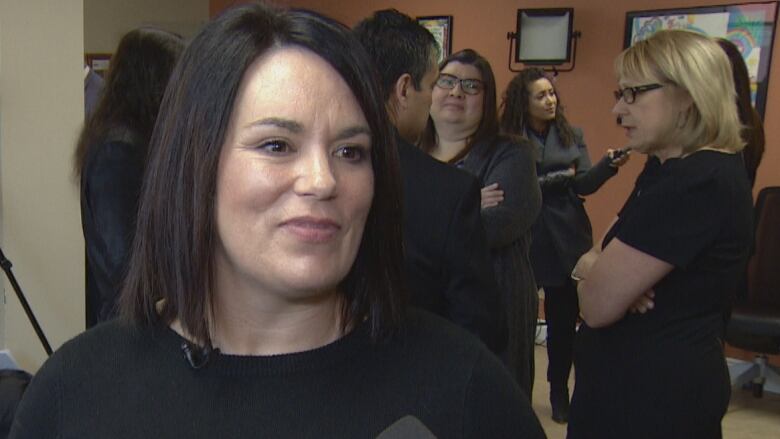'Sentenced to recovery': Alberta expands drug treatment court program
Edmonton, Calgary will see capacity double while program expands to mid-size cities

When Jocelan Yeomans was given the choice of four years in prisonfor dealing drugs or the chance to attend drug treatment court, her decision was easy.
"It was like a golden ticket. Instead I got sentenced to recovery and somebody was looking at me saying, 'You know what? I see some hope in you,'" Yeomanssaid Thursday as the Alberta government unveiled details of its expanded drug treatment court program.
In its first budget, introduced last week, the UCP government said it plans to invest an additional$20 million over four years in the program, whichaims to end the cycle of criminal behaviour fuelled by drug addiction.
The funding will double the annual capacity of the Edmonton and Calgary drug treatment programs from about 40 participants to 80.For the first time, the program will expand to other Alberta cities.
Justice Minister Doug Schweitzer said Thursday his department will work with mid-size cities to get the program up and running as quickly as possible, but it's important to make sure sufficient support services are in place.
He said Red Deer and Lethbridge have already expressed interest.
'It's life-changing'
At the news conference, Yeomanspaused to compose herself as she recalled her own experience. She entered the program in August 2018 and spent 42 days at Poundmaker's Lodge, an Indigenous treatment centre, where she took classes in relapse prevention and co-dependency.
Now shesees a judge once a week and takes random drug-screen tests. InFebruary she will headback to school to become a community support worker.
"It's life-changing," said Yeomans, who is in the final phase of the program. "I don't know where I would be. Probably dead."
'We have to end this cycle'
Schweitzer, who has been holding town hallsacross Alberta as part of his government's efforts to tackle rural crime, saidincarceration alone isn't the answer.
It doesn't provide rehabilitation to offenders who commit drug-related crimes, and it doesn'tdeter drug users from committing crimes to support their addictions, he said.
"As I've been travelling the province I repeatedly hear stories of non-violent offenders who are in a cycle of drug abuse, crime, imprisonment. They're then released and they re-offend. We have to end this cycle."
Schweitzer, who was previously on the board of Calgary's drug treatment court for more than five years, noted that 70 per cent of graduates don't re-offend.
"This will help protect communities by taking steps to prevent the addictions that lead to crime," he said. "This is going to have an immense impact in dealing with addictions and the addiction-fuelled thefts that are happening across Alberta."
The investment is part of a larger strategy by the province to fight the jump in crime plaguing rural communities.
Efforts also include hiring additional Crown prosecutors, boosting funding for the Alberta Law Enforcement Response Teams and funding 4,000 new drug treatment beds. More announcements are expected in coming weeks.
- Frustration and fear as St. Paul area residents share experiences with rural crime
- Graduation from drug treatment court gives man new start on life
Alberta's first drug treatment court was launched in Edmonton in 2005.
Participants must enter a guilty plea before they attend an inpatient treatment program. They report their progress to a judge weekly, take random drug tests and perform community service.

Pam Spurveyended up in drug treatment court aftertwo police raids on her home, where she dealt drugs to support her meth habit.
The program helped Spurvey reconnect with her Creeroots and her family. When she got her kids back, her probation officer bought her a crib.
Nine years ago, she was hired as the first peer support worker for the program across Canada.
"I walk beside the participants that are going through the same journey that I did and give them a sense of hope and let them know that change is possible," Spurvey said.
With files from Janice Johnston and Michelle Bellefontaine












_(720p).jpg)


 OFFICIAL HD MUSIC VIDEO.jpg)
.jpg)



























































































